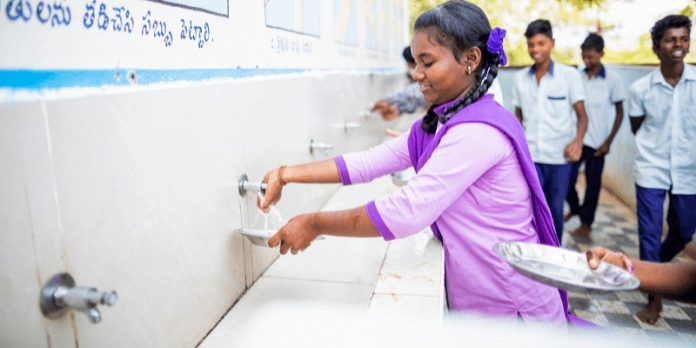
How these young girls are aiding water conservation efforts in Satyavedu, an industrial hamlet in Andhra Pradesh
Date:

Share post:
CSR initiatives benefit many homes. This is about a Corporate Social Responsibility (CSR) initiative by PepsiCo to better lives in the villages of India. In partnership with WaterAid India, PepsiCo Foundation ran an intervention with gram panchayats to address water shortage in schools, anganwadis, and village homes. Together they provided clean water access in Palakkad (Kerala), Nelamangala (Karnakata), and Sri City (Andhra Pradesh). This initiative turned Shashirekha and Vyshnavi into water conservation advocates.
Viraj Chouhan, Chief Govt. Affairs and Communications Officer, PepsiCo India explains, “As part of the project, PepsiCo Foundation and WaterAid has implemented several solutions to increase access to safe water, including restoring wells, harvesting rainwater in schools, and building piped water supply systems for household-level access to safe water. Increased access to clean water has a critical impact on the health and security of residents, particularly women, who otherwise have to walk long distances to collect water, which is physically challenging and can hinder access to employment opportunities as well as spending quality time with the families.”

In addition, to creating community water infrastructure, the long-term focus of the program was to train the local communities to maintain the infrastructure.
The Aim of the Project
Water scarcity and the long-term management of water resources is a critical challenge. The three-year project aimed at ensuring immediate access to sustainable and clean drinking water for the local communities, especially schools and anganwadis.
The project also aimed at: –
- Long-term solutions to increase access to clean water,
- Construction of rainwater harvesting structures in schools, public buildings, and households,
- Repair of non-functioning systems and construction of new systems with locally available technologies,
- Water quality testing with feasible technologies and to provide testing kits to local institutions,
- Formation of Village Water and Sanitation Committees (VWSCs), responsible for water quality, trained on operation and maintenance,
- Educating the community members to adopt sustainable sanitation and hygiene practices,
- Generating public interest and political awareness of water conservation and quality issues, and
- Engaging with the government to scale up the model project across districts.
Shashirekha and Vyshnavi – True Story from Apathy to Advocacy
The stories of 20-year-old Shashirekha and 15-year-old Vyshnavi show how PepsiCo Foundation and WaterAid brought potable water to Satyavedu, a tiny, industrial hamlet nestled on the border between Tamil Nadu and Andhra Pradesh, and changed their lives forever. Today, even after the end of the project, these young girls continue to be strong advocates of water conservation.
Shashirekha, who is from Satyavedu, had to help her parents fetch water all the time. She dropped out of school after class 10 to walk miles to fetch water for daily needs. She says, “My village has 50 households, largely comprising kaccha houses with thatched roofs. About five years back, the local panchayat committee had installed a hand pump in the village for all the residents. Still, due to its disrepair, the hand pump would run dry in the tough summer months, and each family member would take turns to fetch the water to face acute water shortage,”

Vyshnavi from Zilla Parishad School, Rajagopalapuram resides 18 km away from Satyavedu. She regularly missed school during her period because of a lack of sanitation facilities. Vyshnavi says, “During my periods, I had no choice but to miss my school and stay at home. There was no running water in the taps in the toilet, and we did not even have a separate washroom for girls. It didn’t feel safe, and I felt uncomfortable going to school during my periods. I was forced to miss classes for years and couldn’t follow what was taught in class. As a result, my studies suffered a lot.”
With help and training from the CSR project, Shashirekha is now an active member of the village user committee. She handles the maintenance of pumps to ensure water conservation.
Vyshnavi, on the other hand, learned plumbing. She even knows how to operate a motor pump; and clean bore wells, store reservoirs, and water stand posts. She was appointed as the Minister for Girl’s protection in the School Cabinet Committee, training girls on personal hygiene and safe menstrual hygiene practices.
Today, the lives of both Shashirekha and Vyshnavi have gone from agony to advocacy. They have become water warriors for their villages. They ensure every hut gets sufficient water for drinking, bathing, cooking, and washing. Knowing what water scarcity means, they are now working hard to conserve water for future generations.
